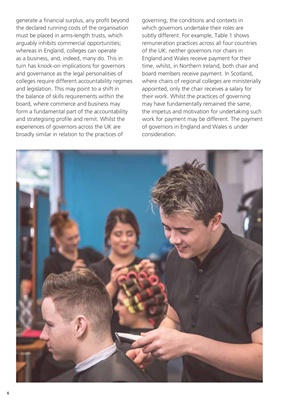
6
generate a financial surplus, any profit beyond
the declared running costs of the organisation
must be placed in arms-length trusts, which
arguably inhibits commercial opportunities;
whereas in England, colleges can operate
as a business, and, indeed, many do. This in
turn has knock-on implications for governors
and governance as the legal personalities of
colleges require different accountability regimes
and legislation. This may point to a shift in
the balance of skills requirements within the
board, where commerce and business may
form a fundamental part of the accountability
and strategising profile and remit. Whilst the
experiences of governors across the UK are
broadly similar in relation to the practices of
governing, the conditions and contexts in
which governors undertake their roles are
subtly different. For example, Table 1 shows
remuneration practices across all four countries
of the UK: neither governors nor chairs in
England and Wales receive payment for their
time, whilst, in Northern Ireland, both chair and
board members receive payment. In Scotland,
where chairs of regional colleges are ministerially
appointed, only the chair receives a salary for
their work. Whilst the practices of governing
may have fundamentally remained the same,
the impetus and motivation for undertaking such
work for payment may be different. The payment
of governors in England and Wales is under
consideration.